Papillon
Di_Studio/iStock / Getty Images Plus via Getty Images
Papillon is the French word for butterfly, and it’s easy to see why the Papillon dog breed was given that name. These small dogs have big ears with long, wispy hairs that resemble a butterfly’s wings.
Papillons have been depicted in artwork dating to the 16th century in Western Europe, according to the Papillon Club of America (PCA). Papillons are still extremely popular family dogs and canine companions today.
At 8–11 inches tall and 5–10 pounds, Papillons are compact and adaptable. Despite their dainty stature and elegant coat, Papillons do well in any climate or setting. They are happy, friendly dogs and love spending time with their humans. Papillon dogs also excel in the agility ring and sometimes work as therapy and service dogs, according to the PCA.
Caring for a Papillon
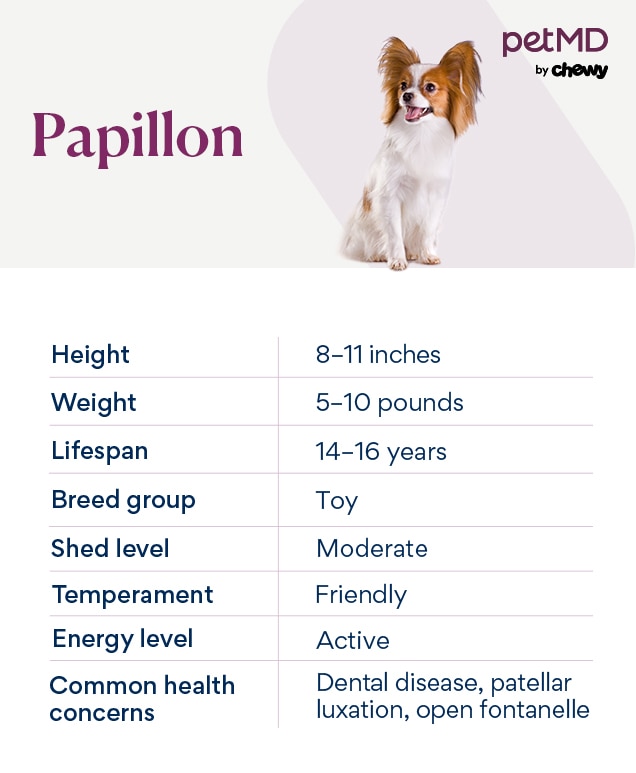
A Papillon’s personality is shaped by the breed’s history; for hundreds of years, they served as companion animals. While every pup is an individual, many Papillons are friendly, adaptable dogs who love being in your lap or curled up next to you on the couch after they've had a chance to burn off some of their boundless energy.
As smart dogs, they need lots of mental stimulation and attention. Their small size makes them a good dog for apartments, where their playful energy can be expended during indoor games or neighborhood walks. However, Papillons do tend to be more active than other toy breeds, so they need more exercise than you might think and love having access to fenced areas where they can run and play.
The Papillon breed has long, feathered fur that needs brushing or combing a few times a week to prevent matting and tangles. Pet parents also need to dedicate themselves to training—with consistency and positive reinforcement, a Papillon puppy can grow to be the ideal companion.
Papillon Health Issues
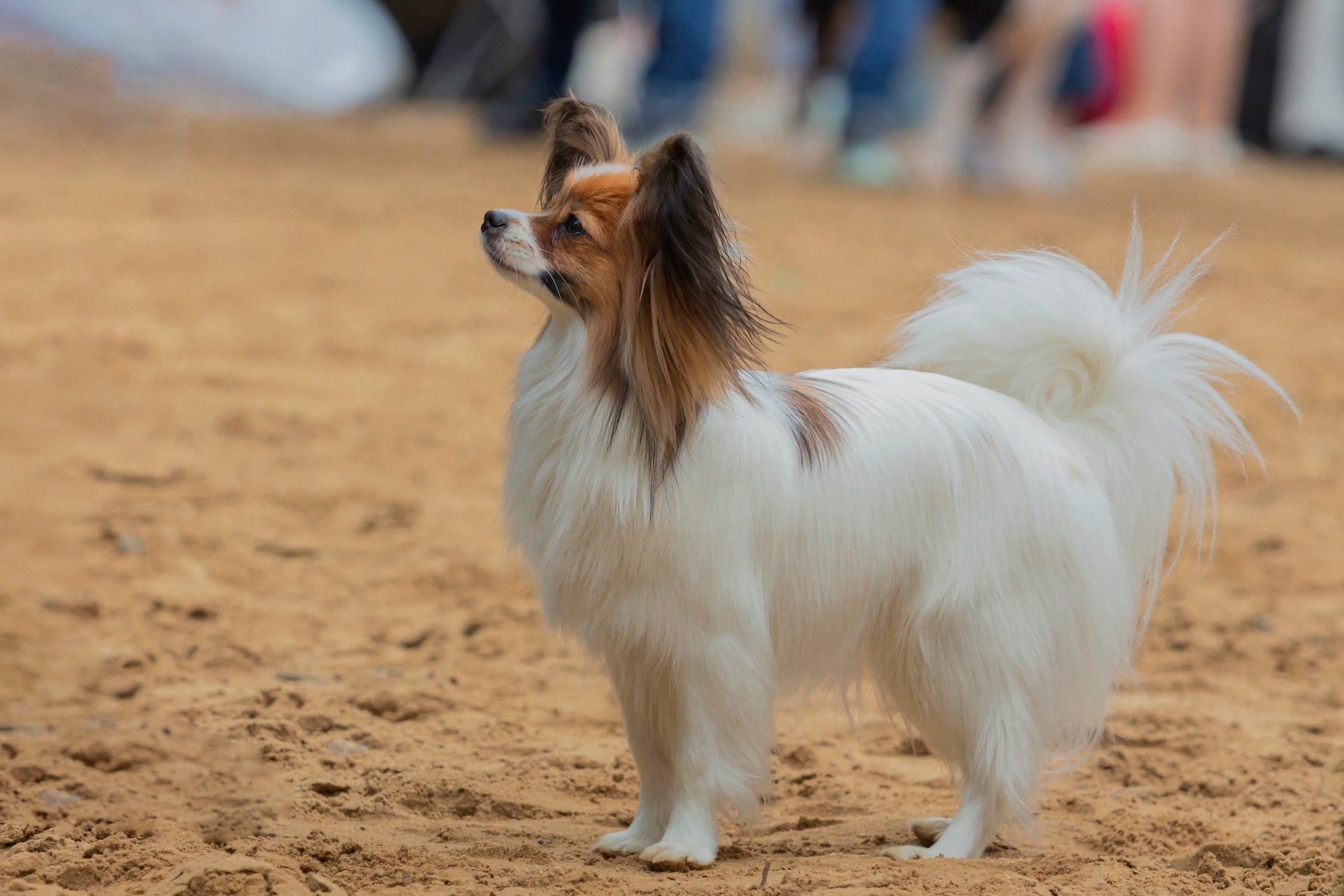
The average Papillon lifespan is 14–16 years, and they’re one of the dog breeds with the longest life expectancies. They’re generally a healthy breed; however, there are some potential inherited conditions to be aware of.
Open Fontanelle
Responsible Papillon breeders will screen for an open fontanelle in their puppies’ skulls. An open fontanelle is a condition similar to the soft spot of a human baby’s skull and normally closes when a Papillon puppy is 9–12 weeks of age. But in some dogs, it can persist to adulthood.
This is an inherited condition that’s more commonly seen in toy or small-breed puppies. If the open fontanelle persists, it typically does not affect the dog but could increase susceptibility to a brain injury.
There’s no treatment and affected Papillons shouldn’t be bred.
Luxating Patella
Papillons can develop luxating patella, an inherited condition where one or both kneecaps pop in and out of place. This is typically screened for by responsible breeders.
Although mild patellar luxation is not considered a painful condition, more severe cases can be and may cause a dog to favor one leg and predispose dogs to arthritis. Depending on the severity, surgery may be recommended.
Dental Disease
Papillons need regular at-home dental care as well as routine dental cleanings to prevent periodontal disease. The best thing parents can do at home is to brush their dog’s teeth every day, but other methods can also be helpful, including:
-
Feeding your Papillon a dental health-focused dog food
-
Giving dental chews in place of other treats
-
Adding supplements to your dog’s food and water
Collapsing Trachea
The trachea is also called the windpipe, and it’s the tube that carries air from a dog’s nose and mouth to the lungs. When this tube flattens, it’s called tracheal collapse. This makes it difficult for a dog to breathe and often causes a cough that sounds like a goose honk.
The condition is often mild and can be treated medically. Surgery may be needed for severe cases.
Progressive Retinal Atrophy (PRA)
Progressive retinal atrophy (PRA) is a group of genetic disorders that cause the eye’s retina to break down, resulting in blindness. The condition isn’t painful, but there is no cure. However, many dogs can adjust well to vision loss with some extra help from their pet parents.
What To Feed a Papillon
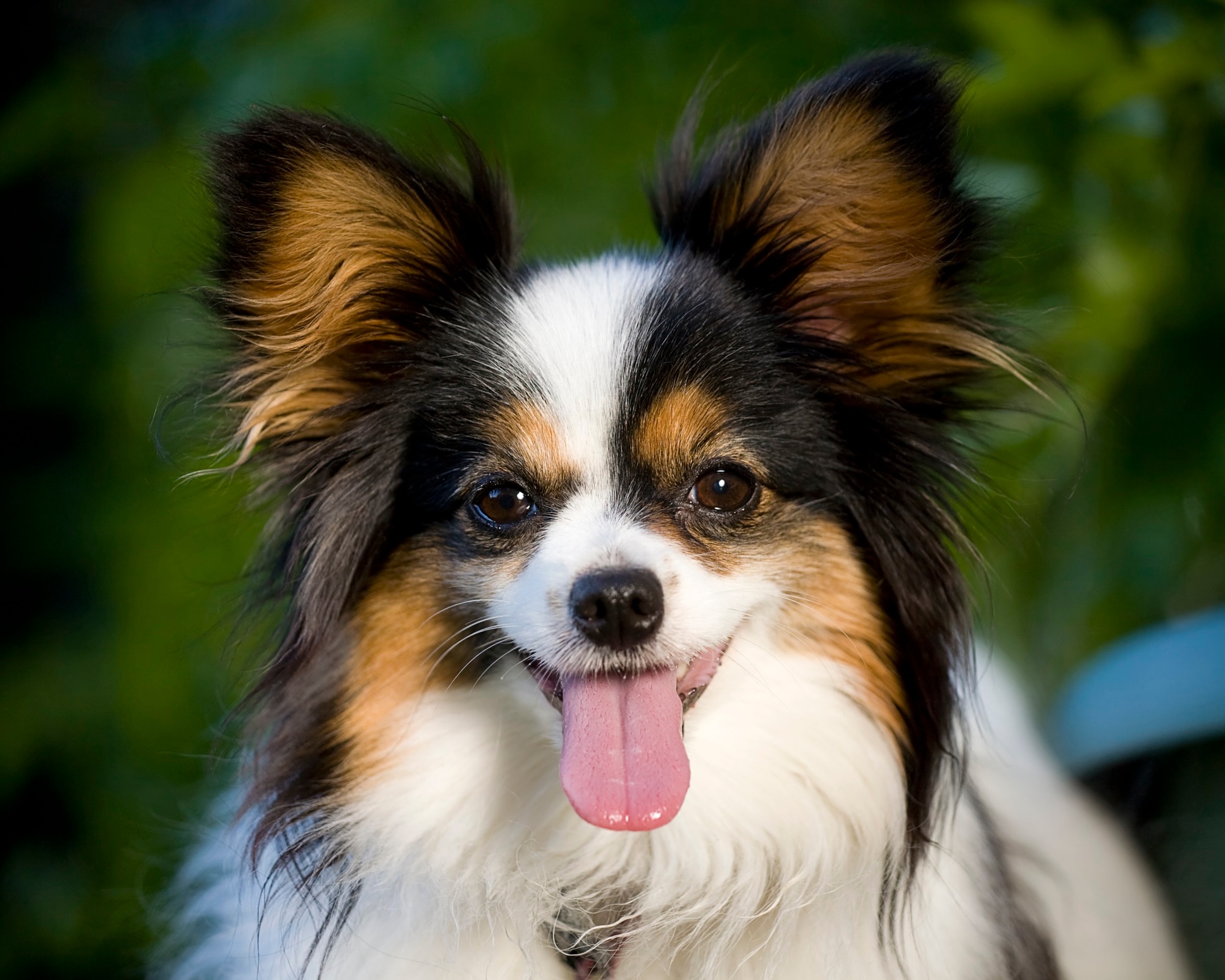
Selecting the best diet for Papillon dogs and puppies is based on the needs of the individual. While it’s always important to choose a diet that meets the nutritional guidelines set by the Association of American Feed Control Officials (AAFCO), it’s best to discuss food with your veterinarian, who can make a recommendation based on your dog’s medical history.
Always measure out your dog’s food. If your pup eats too much or doesn’t get enough exercise, they can become obese, which leads to other health problems.
How To Feed a Papillon
Due to their small size, Papillon puppies are susceptible to hypoglycemia (low blood sugar) if they don’t eat enough food at regular intervals throughout the day. This can be avoided by feeding small meals four times a day until the puppy is about 4 months old.
At this age, the dog’s body is more developed and better suited to regulate glucose levels, and you can make the transition to three meals a day. Adult Papillons typically do well with two meals a day—morning and evening.
How Much Should You Feed a Papillon?
It’s important to follow your vet’s advice when figuring out how much to feed your dog. You can also use the dog food packaging’s label; this will give you guidance based on your Papillon’s weight.
Nutritional Tips for Papillons
Dogs eating an AAFCO-compliant food should receive all the nutrients they need. But your vet may recommend a supplement for your dog based on their health.
For Papillon dogs with luxating patellas, joint supplements with glucosamine and chondroitin can help keep the joints healthy. Additionally, omega-3 supplements can aid in maintaining joint health and help keep skin and coat lush and soft.
Behavior and Training Tips for Papillons
Papillon Personality and Temperament
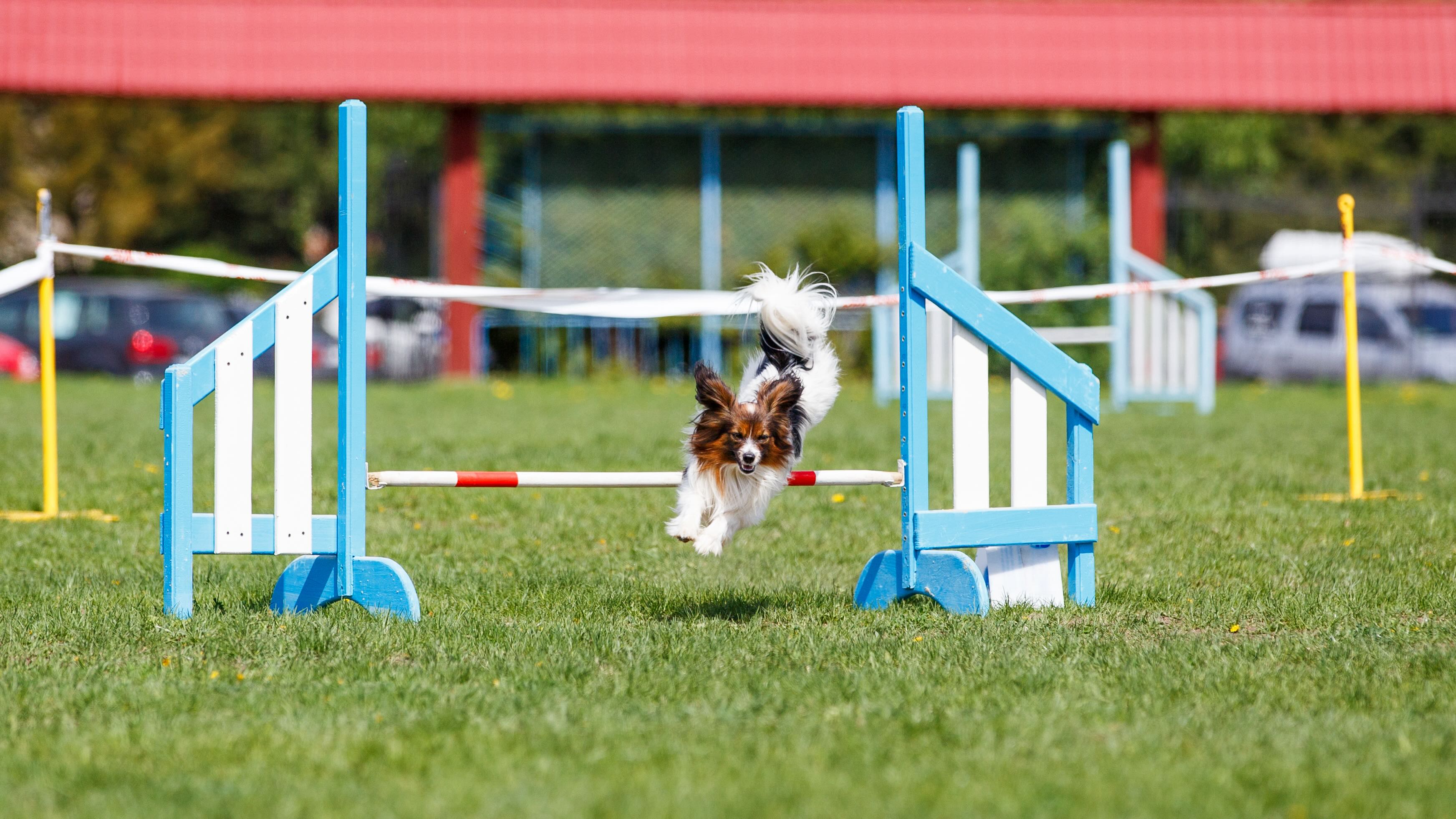
Papillons are an intelligent breed that love to spend time with their family and give kisses, according to the breed club. They don’t have a reputation for being nervous and often love to meet new people, especially when socialized from puppyhood.
Papillons live well with other dogs, cats, kids, adults, and seniors alike. But know that very young or very rambunctious children can easily (though accidentally!) injure small dog breeds like the Papillon, so make sure to supervise their interactions.
While they enjoy a good cuddle, Papillons are no couch potatoes. They are active, playful, and need daily exercise and mental stimulation. The good news is that their petite size makes this task easy, indoors or outdoors; Papillons are happy to play with toys inside the home, go for leash walks, or run around in a fenced-in yard.
Papillon Behavior
Papillons are companion dogs at heart and are eager to please their humans. However, some Papillons may develop separation anxiety. This can result in undesired behaviors, such as excessive barking or destructive activities, like chewing your furniture.
Crate training your dog can help with mild separation anxiety, as can leaving your pup with enrichment toys whenever you’re away from home. A comprehensive behavioral modification plan is usually necessary for severe cases of separation anxiety.
Papillon Training
Papillons are one of the smartest dog breeds and are eager to please their human, so obedience training can be easy when proper methods are used. Sessions need to be consistent, fun, and positive for your pup.
Like many small breeds, Papillon puppies can be challenging to house train. Be patient and schedule lots of potty breaks; you can ask your veterinarian or a certified dog trainer for advice if needed.
Begin socializing your Papillon puppy from the moment they come home and ask your breeder how they’ve approached socialization so far. While Papillons are known to be happy and friendly dogs, early socialization can prevent behavior problems and helps dogs grow into confident and well-mannered adults.
Fun Activities for Papillons
-
Leash walking
-
Indoor/outdoor playing with their people
-
Obedience
Papillon Grooming Guide
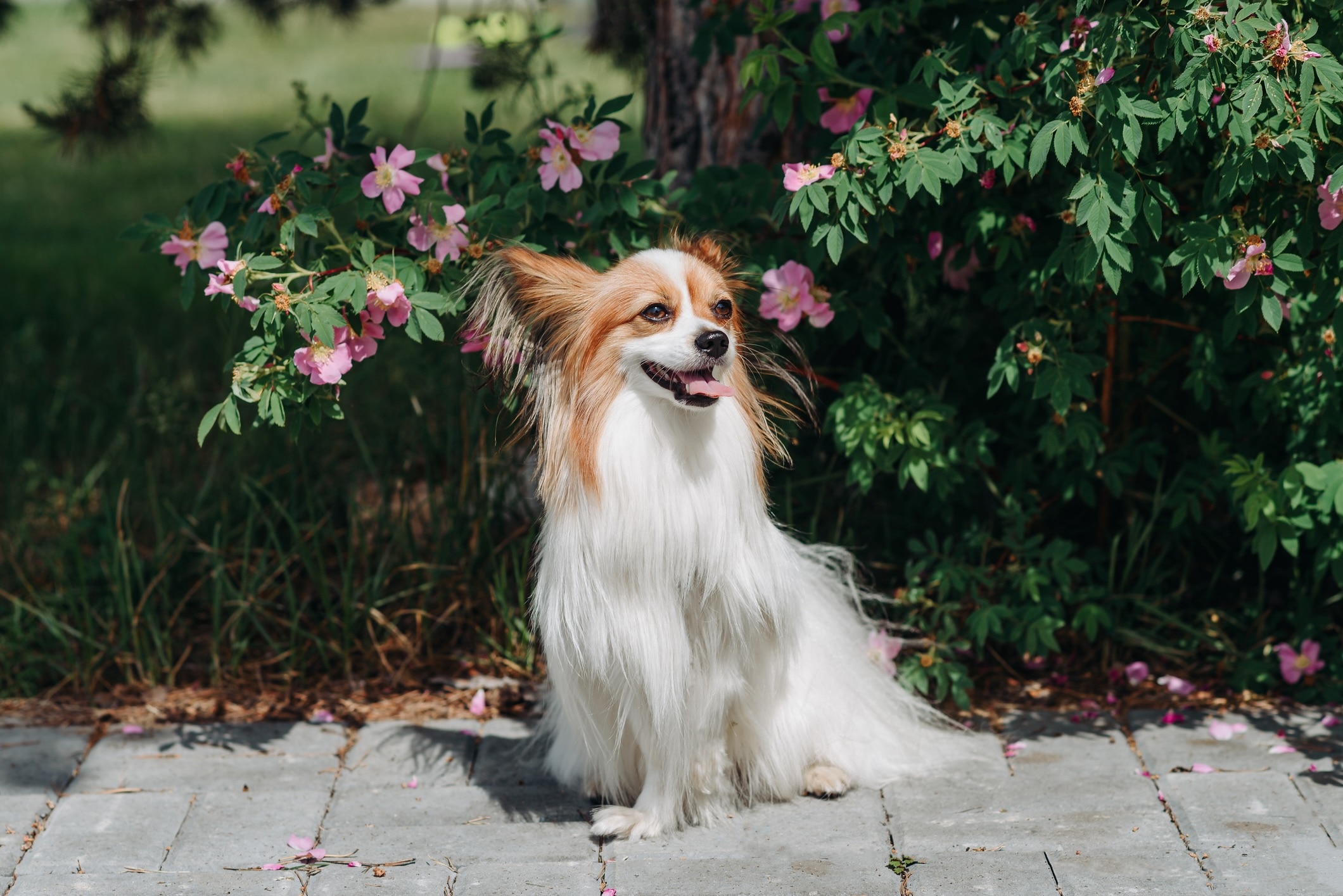
Despite their long, silky coat, Papillons don’t require excessive grooming because they don’t have an undercoat. However, they still need a quick brushing session every few days to prevent matting and reduce shedding.
Skin Care
Papillons don’t typically have sensitive skin, but contact your vet if you notice redness, flaking, itching, or irritation.
Regular brushing and bathing to maintain your Papillon’s coat is the best way to keep the skin healthy, too, as debris caught in the fur can lead to skin irritation. Ask your vet how often you should bathe your dog and which dog-friendly shampoo is a good fit.
Coat Care
Papillon dogs are not hypoallergenic, and they shed moderately throughout the year. Brush your dog every few days to keep their fur healthy and free of tangles. Pay special attention to their ear fringe, which is particularly prone to matting. A pet comb or pin brush generally works well on a Papillon's coat.
Eye Care
Papillons can experience tear staining, which can be cleaned with a vet-approved eye cleanser. Talk to your vet if you notice changes in your dog’s eyes, including abnormal discharge or cloudiness.
Ear Care
Check your dog’s ears every week for redness, debris, or signs of infection. Routine cleaning with a veterinarian-approved ear cleanser can help dogs who are prone to ear infections. This should also be done any time a Papillon is in water, such as after swimming or bathing.
Dental Care
Brush your Papillon’s teeth every day to prevent periodontal disease. Other prevention methods, such as supplements, a dental diet, and dental chews, can also help—but they are no substitution for brushing.
Nail Care
Many Papillons need to have their nails trimmed every four to six weeks. Using a nail clipper designed for small dogs or an adjustable nail grinder helps make the task easier.
Considerations for Pet Parents
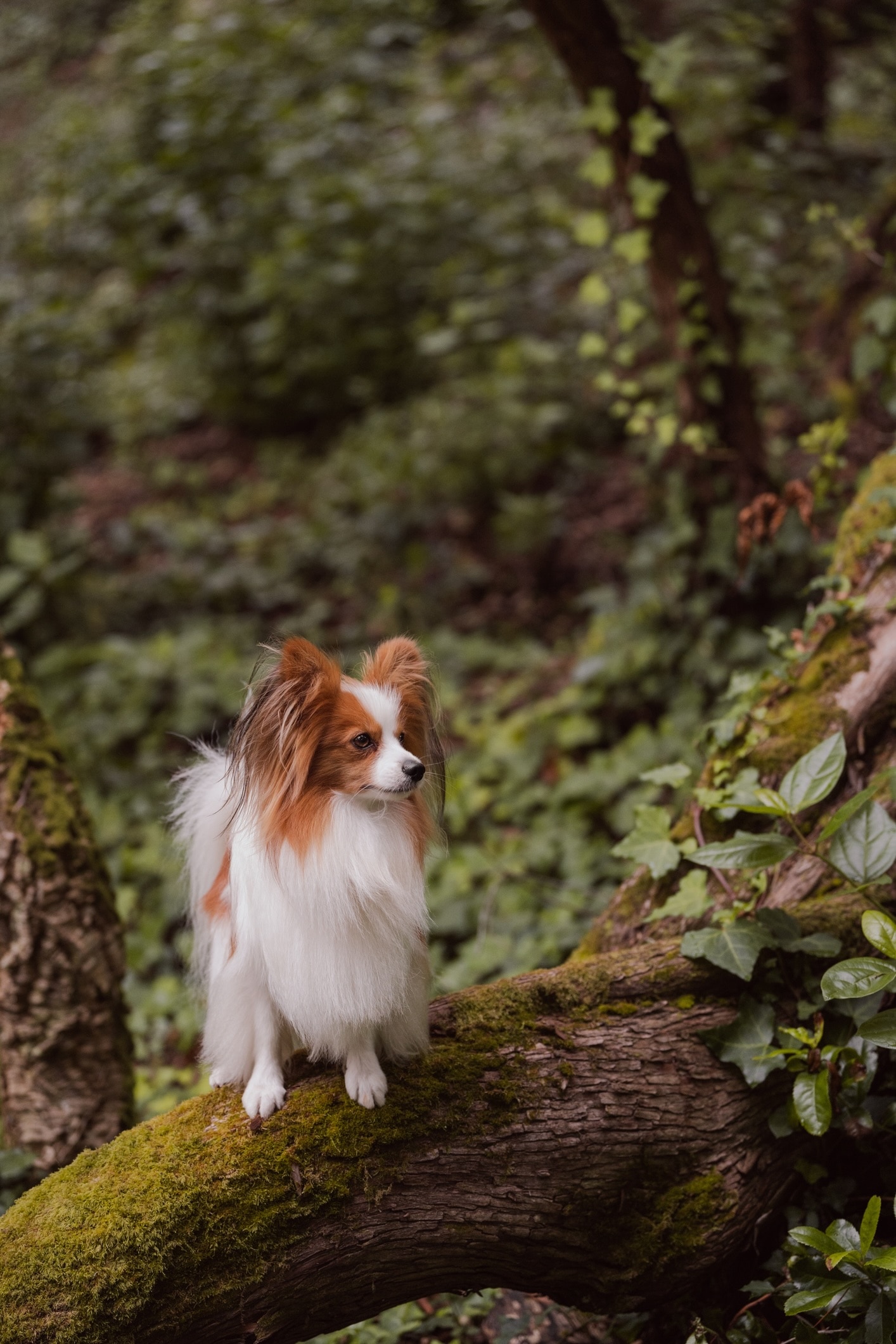
The Papillon’s silky, long coat can be very attractive, and this breed will do best in a home that is able to provide the necessary maintenance of that coat. Papillons are highly intelligent and active dogs and enjoy participating in activities with the whole family, indoors and outdoors.
They are affectionate and responsive to the people they have bonded to, which can sometimes lead to separation anxiety when their humans are away. Luckily, Papillons can also bond to other pets, which can sometimes prevent unwanted behaviors.
Papillon FAQs
Is a Papillon a good family dog?
Yes, Papillons are great family dogs because they are affectionate and have the energetic personality to keep up with children. They can be unintentionally injured by very small or rambunctious children, however.
Are Papillons smart dogs?
Yes, Papillons are one of the smartest dog breeds.
How much does a Papillon cost? Why are Papillons so expensive?
A Papillon puppy from a reputable breeder typically costs $1,000–$2,000. But this varies based on the dog’s lineage, where you live, and other factors. You can also adopt a Papillon from breed-specific rescues or shelters.
Do Papillon dogs bark a lot?
All dogs bark, and Papillons do have a reputation for barking often. That said, if you exercise your dog, provide enough mental stimulation, and train them to stop barking, this behavior won’t be as common.
